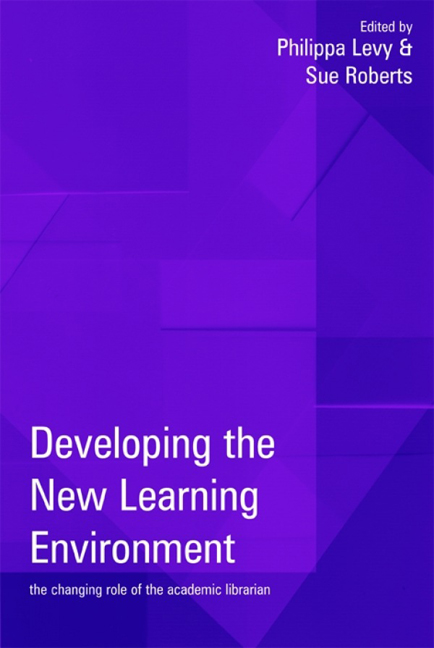Book contents
- Frontmatter
- Contents
- The editors and contributors
- Introduction: the challenge for the academic librarian
- Part 1 Perspectives on the policy framework
- 1 The policy framework: a critical review
- 2 Pedagogy in a changing environment
- 3 Literacies and learning
- 4 Key issues in the design and delivery of technology-enhanced learning
- 5 New professional identities and practices for learner support
- Part 2 Policy into practice
- Part 3 Reflections
- Index
4 - Key issues in the design and delivery of technology-enhanced learning
from Part 1 - Perspectives on the policy framework
Published online by Cambridge University Press: 08 June 2018
- Frontmatter
- Contents
- The editors and contributors
- Introduction: the challenge for the academic librarian
- Part 1 Perspectives on the policy framework
- 1 The policy framework: a critical review
- 2 Pedagogy in a changing environment
- 3 Literacies and learning
- 4 Key issues in the design and delivery of technology-enhanced learning
- 5 New professional identities and practices for learner support
- Part 2 Policy into practice
- Part 3 Reflections
- Index
Summary
Following on from the broader discussion of pedagogy and pedagogical development in the networked environment in Chapter 2, this chapter focuses in particular on pedagogical and learning support issues raised by the fusion of e-learning environment systems with digital libraries and resources. Taking the position that access to digital content is not synonymous with e-learning but is an essential element of it, Allison Littlejohn illustrates the role of information access, sharing and use within the context of a constructivist model for e-learning design. With reference to three practical scenarios in e-learning design and delivery, she highlights potential directions for the learning support contribution of the librarian, with impact on both educational development and student learning. While these scenarios might not yet be widely operational, they reflect leading-edge developments in e-learning and open up intriguing perspectives on likely trends in pedagogical design and on the opportunities and challenges ahead for librarians in this context. The chapter concludes with the view held by other contributors to this volume: that new demands in the educational environment require a new type of practice in academic librarianship, in which traditional professional expertise is blended with expertise in information and communication technology and educational design.
Libraries are more than an interface to collections of resources, having an important role to play in supporting learning as a social process (Vygotsky, 1978). Learners view libraries as places for social gatherings, and for individual and shared study as well as the sharing of information resources (Currier, 2002). In the digital environment these social and collaborative interactions are possible irrespective of location or point in time. Developments in digital and ‘hybrid’ libraries aim to extend beyond conventional elements of library activities such as facilitating access to online journals and electronic books towards support for these sorts of collaborative activities (Wang and Hwang, 2004). This requires integration with virtual learning environment (VLE) systems.
Every day in the UK, thousands of students access virtual learning spaces to download course information and learning resources (Britain and Liber, 2004). Many institutional VLEs are already linked to university libraries, giving access to a variety of online resources, including e-books and e-journals.
- Type
- Chapter
- Information
- Developing the New Learning EnvironmentThe changing role of the academic librarian, pp. 70 - 90Publisher: FacetPrint publication year: 2005
- 1
- Cited by



